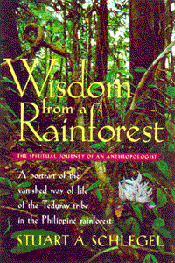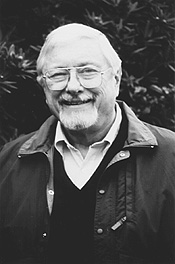![[Currents header graphic]](http://www.ucsc.edu/homeart/currents_header.gif)
![[Currents header graphic]](http://www.ucsc.edu/homeart/currents_header.gif)
November 9, 1998

|
Stuart Schlegel, professor emeritus of anthropology, has published a new book Wisdom from a Rainforest: The Spiritual Journey of an Anthropologist. The book is a personal account of Schlegel's years living in a remote rainforest community and the ways in which the wisdom of the Teduray tribe affected the rest of his life.
Schlegel spent two years living as part of a small community of Teduray on the island of Mindanao in the southern Philippines in the mid-1960s. He was deeply affected by the experience, which he says "raised real questions for me about how I wanted to live my life."
"The Teduray don't believe in competition or ranking or violence," said Schlegel. "They are completely egalitarian. They believe the world is filled with abundance if you cooperate and that you will create scarcity for some if you compete. They are constantly scanning to see how they can help each other."
Schlegel writes of his attempt to integrate some of the ways of the Teduray into his own life, making a lifelong commitment to nonviolence and trying to avoid emotional and spiritual violence in his life. And he shares the experience of losing his son Leonard, who died of cancer in 1993 at the age of 31.
"I don't succeed all the time, any more than anyone else, but I try," said Schlegel. "The Teduray didn't always live up to their own values, either, but most of the time they did. It's a vision of how to live, and you aim for it."
Schlegel, who retired in 1987, spent 18 months writing the book, which is his seventh. He first encountered the Teduray as a missionary in the early 1960s. Eager to establish a different relationship with the people, he returned to the Philippines in 1966 to do anthropology dissertation research on the Teduray legal system.
"They had very elegant ways of settling disputes," recalled Schlegel. "They were not adversarial at all."
The Teduray had no gender politics, with members of the tribe able to essentially choose their own gender roles. "Most chose the gender of their physical sex, but nobody cared if you chose the other gender," explained Schlegel. "It was perfectly accepted, and I'm quite sure those individuals had sexual partners. The only difference was that they didn't marry. Marriage was an economic unit for raising children, so there was no need for that among couples who weren't going to have children."

|
In the mid-1960s, gender politics had not yet emerged as a subject ripe for academic study and discussion, noted Schlegel, who said he didn't pay as much attention to those dynamics as he would have had he anticipated the explosion in gender studies that was imminent.
"I never was more than a visitor or guest in the Teduray forest, but I certainly came away with the desire to take those values with me outside the forest," he said of the experience.
Schlegel lived in the bush for months at a time while his wife and two young sons stayed with a Philippine family. Every two months, Schlegel would make the two-day journey to visit his family, hiking for a day, then taking a seven-hour boat ride followed by a bus trip to the community of Mirab.
Despite the awe Schlegel felt regarding the sensitivity to others expressed daily by the Teduray, he acknowledges now that he wasn't particularly sensitive at the time to the stresses his research project placed on the members of his own family. "My wife, Audrey, was raising two little children without water or electricity. It wasn't until years later that I realized what an ordeal I'd put her through," he said.
At the time of Schlegel's research, the tribe numbered about 30,000 total; his community, Figel, was made up of about 120 members who hunted, fished, gathered food, and cultivated slash-and-burn plots in the forest. They didn't do any metalsmithing or weaving so had some contact with outside markets for those goods but were primarily self-sufficient, said Schlegel.
In a tragic turn, the village of Figel was wiped out in 1972, when residents were caught up in the conflict between rebel Muslim ethnic groups and the Philippine government.
"The government chased the guerrillas into the forest, and the rebels tried to steal the Teduray women," recalled Schlegel. "The Teduray were fighting with blowguns, bows and arrows, and a few homemade shotguns, but the guerrillas had assault weapons. It was like My Lai. It was such an emotional blow to me that I never went back."
The massacre left Schlegel feeling like "the inheritor of the message and the steward of the Teduray spirituality."
In the years that followed, the forest has been relentlessly cut down, he noted, and the people living "the old way" have been harassed out of their traditions. "I suspect there are few survivors, if any," noted Schlegel, who has kept in touch over the decades with the family that hosted his wife and children and with two field assistants.
Schlegel will discuss his experiences among the Teduray during an appearance at the Capitola Book Cafe on Tuesday, November 10, at 7:30 p.m. His book may be ordered from the University of Georgia Press at 1-800-266-5842.